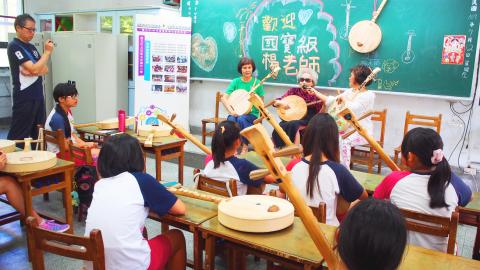Taipei’s Beitou Elementary School has become the first school in the nation to teach liamkua (唸歌) — a traditional Taiwanese form of performance art that interweaves talking and singing — as part of its Hoklo (commonly known as Taiwanese) language curriculum.
The school has hired liamkua singers, and is offering a class teaching the moon guitar (yueqin, 月琴) — a lute with an oval sound box commonly used in traditional Chinese operas.
On Friday, it invited liamkua performer Yang Hsiu-ching (楊秀卿) to sing with students and give them pointers.

Photo: Tsai Ya-hua, Taipei Times
Speaking at the school, Yang said she hopes more emphasis will be placed on the preservation of liamkua, adding that it is an important part of the nation’s culture.
In 2009, Yang became the first person appointed by the Executive Yuan’s Council for Cultural Affairs to help preserve the sung and spoken arts, and was recognized for her one-woman performances in which she plays various roles in different voices.
Yang, 80, who was blinded at the age of four due to an illness, said she started performing liamkua after her father said he hoped that she could develop a skill that would make her self-reliant.
She regrets that young people today are not familiar with liamkua and that many are unable to even speak Hoklo, Yang said, adding that she was once performing outside a department store and tried to speak in Hoklo to a child playing nearby, who said: “Speak Mandarin, I don’t understand Taiwanese.”
She hopes schools can teach children about traditional culture from a young age, so that they can better understand their heritage and the popular customs of their ancestors, Yang said.
Beitou Elementary School principal Weng Shih-meng (翁世盟) said the school serves an important role by promoting the yueqin.
The school started a yueqin community two years ago as part of its localization curriculum, he said, adding that the program shows students how the instrument is connected with Hoklo literature and the nation’s music.
The school has purchased 30 yueqin that it provides to students for use in class twice a week, he said.
The mother of fourth-grade student Lee Tzu-ying (李姿瑩) said she encouraged her daughter to start learning the instrument in grade three, as it would enable her to speak Hoklo more fluently and learn a new instrument.
Another student who is graduating this year, surnamed Chu (朱), said she decided to learn the yueqin after her mother told her it was a part of a culture that was being lost, adding that she found the use of a pick in playing the instrument to be interesting.
Wang Jui-wen (王瑞文), a teacher at the school, said he also asked Yang to teach him to play the instrument with the hopes of passing it on to future generations.
The school said it plans to continue its yueqin lessons over the summer break.

Chinese Nationalist Party (KMT) Chairman Eric Chu (朱立倫), spokeswoman Yang Chih-yu (楊智伃) and Legislator Hsieh Lung-chieh (謝龍介) would be summoned by police for questioning for leading an illegal assembly on Thursday evening last week, Minister of the Interior Liu Shyh-fang (劉世芳) said today. The three KMT officials led an assembly outside the Taipei City Prosecutors’ Office, a restricted area where public assembly is not allowed, protesting the questioning of several KMT staff and searches of KMT headquarters and offices in a recall petition forgery case. Chu, Yang and Hsieh are all suspected of contravening the Assembly and Parade Act (集會遊行法) by holding

PRAISE: Japanese visitor Takashi Kubota said the Taiwanese temple architecture images showcased in the AI Art Gallery were the most impressive displays he saw Taiwan does not have an official pavilion at the World Expo in Osaka, Japan, because of its diplomatic predicament, but the government-backed Tech World pavilion is drawing interest with its unique recreations of works by Taiwanese artists. The pavilion features an artificial intelligence (AI)-based art gallery showcasing works of famous Taiwanese artists from the Japanese colonial period using innovative technologies. Among its main simulated displays are Eastern gouache paintings by Chen Chin (陳進), Lin Yu-shan (林玉山) and Kuo Hsueh-hu (郭雪湖), who were the three young Taiwanese painters selected for the East Asian Painting exhibition in 1927. Gouache is a water-based

Taiwan would welcome the return of Honduras as a diplomatic ally if its next president decides to make such a move, Minister of Foreign Affairs Lin Chia-lung (林佳龍) said yesterday. “Of course, we would welcome Honduras if they want to restore diplomatic ties with Taiwan after their elections,” Lin said at a meeting of the legislature’s Foreign Affairs and National Defense Committee, when asked to comment on statements made by two of the three Honduran presidential candidates during the presidential campaign in the Central American country. Taiwan is paying close attention to the region as a whole in the wake of a

OFF-TARGET: More than 30,000 participants were expected to take part in the Games next month, but only 6,550 foreign and 19,400 Taiwanese athletes have registered Taipei city councilors yesterday blasted the organizers of next month’s World Masters Games over sudden timetable and venue changes, which they said have caused thousands of participants to back out of the international sporting event, among other organizational issues. They also cited visa delays and political interference by China as reasons many foreign athletes are requesting refunds for the event, to be held from May 17 to 30. Jointly organized by the Taipei and New Taipei City governments, the games have been rocked by numerous controversies since preparations began in 2020. Taipei City Councilor Lin Yen-feng (林延鳳) said yesterday that new measures by